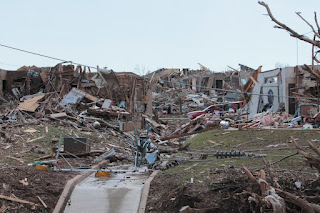Earthquake Hazards
What are earthquake hazards? There are more than the obvious.
The most obvious hazards of earthquakes are the earth shaking and damage to buildings. Included with the ground shaking are the hazards of objects falling down and injuring (or killing) you. Most people expect damaged and collapsed buildings after an earthquake, although, unless you’ve actually seen the aftermath of a large earthquake it can be hard to visualize as videos don’t provide the same impression.
Besides the main earthquake, the single biggest earthquake hazard most people face is entering into an unsafe building. Buildings damaged by earthquakes can increase your risk of injury or death, particularly if an aftershock strikes and causes the already weakened structure to partially or fully collapse.
Incidentally, the risk of falling debris is the biggest reason you shouldn't go running (or walking) out of a building during an earthquake. And, if you're near a structure during a quake, particularly if it's an older or unreinforced masonry building, you need to get under protective cover or move away from the building. The single greatest hazard is the risk of something falling on you.
Unlike a hurricane or tornado, the safest place in an earthquake is actually outside, in completely open space, where nothing has a chance of falling on you.
However, an earthquake can pose a number of other hazards. Some are obvious, while others may not be so evident. So, while you might avoid having something fall on you, you need to be aware of other hazardous risks of earthquakes.
Besides damaged buildings and infrastructure, and the inevitable aftershocks, earthquakes can also cause seiches, dam failures, flooding, fires, landslides and rockfalls, liquefaction, surface fault ruptures, and tectonic subsidence. In some cases, earthquakes have caused the release of hazardous materials, and near the coast earthquakes can cause tsunamis.
When you consider the earthquake risks for your area, make sure you also identify other potential hazards and threats that an earthquake can cause. Identifying these other hazards—such as flooding, seiches, landslides, and liquefaction potential—can help you become better prepared.


Comments
Post a Comment